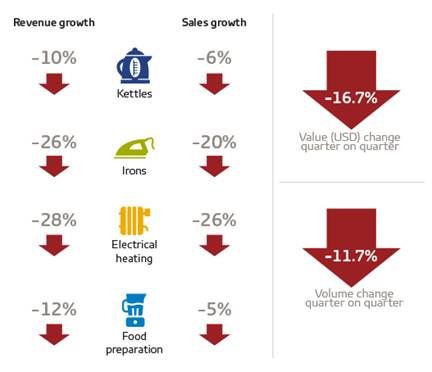Small domestic appliances markets 2016 overview
Small domestic appliance (SDA) sales in South Africa declined 17% to US$228m (about R3bn) in 2016, with kettles and irons accounting for 43% of market value.
Newly released data from GfK South Africa shows that is the first time the SDA market has shrunk in five years, reflecting tight economic conditions in South Africa. Electrical heating experienced the biggest decline in value, followed by irons. On a more positive note, revenue for SDA in June 2017 was up 5% compared to the same month in 2016, which may bode well for December, which is generally the biggest month for appliance sales.

During 2016 demand for small domestic appliances declined in South Africa
Brick-and-mortar outlets enjoy the lion’s share of the market, accounting for 74% of total SDA revenue. This indicates that South African consumers prefer to touch and, in some cases, test the device before they purchase. However, GfK expects that more SDA products will be sold online as internet penetration increases and consumers become more comfortable with e-commerce. This trend is already unfolding in categories such as books and music.
2017 overview: External factors affecting the market
GfK believes that the downgrade of South Africa’s sovereign credit rating, the technical recession and political uncertainty may suppress consumer spending through 2017. Affordable trade brands are expected to grow market share at the expense of pricier multinational brands.
Premium brands are likely to experience a knock in sales as consumers start to shop around for better value for money. The slowdown in demand is expected to negatively impact revenue going forward, unless brands are able to adapt their strategies to a changing market.
As wallet share skews towards food and other necessities, consumers are expected to prolong the lifespan of their domestic appliances, in turn decreasing demand for SDAs.
2017 consumer trends
The growing trend in South Africa of “healthy eating and living” – influenced by healthy eating TV shows – may spur more demand for food preparation appliances, especially liquidisers and juicers.
A culture of drinking high-quality coffee is rising in South Africa, which could translate into robust demand for good espresso machines, especially as consumers opt to dine in and entertain at home as a result of their shrinking disposable income.
Possible solution for both manufactures and retailers
Says Nikolay Dolgov, General Manager, Point of Sales Tracking at GfK South Africa: “Against the backdrop of challenging market conditions, retailers and manufacturers need to adopt new pricing strategies and create value-creating promotions that help consumers to save money. Access to accurate point-of-sales data can enable brands to continuously monitor market developments and forecast trends, so that they can make smart decisions about promotions, pricing and marketing in order to build a sustainable competitive advantage.”
GfK POS (Point of Sales) Tracking
GfK POS panel is based on the sales data gathered from over 425,000 outlets worldwide and more than 4,000 outlets in South Africa. A panel study is a periodic study where sales and price trends of product groups, features, and other attributes are audited in the defined sales channels in retail. GfK South Africa SDA POS Panel audits 13 product groups including kettles, irons, food preparation machines, hot beverage machines, shavers, deep fryers, rice cookers, clippers, electrical heating, sandwich/waffle/grillers, vacuum cleaners, toasters and electrical cooking pots. It provides brands with accurate sales and market share data on weekly basis.
GfK
GfK is the trusted source of relevant market and consumer information that enables its clients to make smarter decisions. More than 13,000 market research experts combine their passion with GfK’s long-standing data science experience. This allows GfK to deliver vital global insights matched with local market intelligence from more than 100 countries. By using innovative technologies and data sciences, GfK turns big data into smart data, enabling its clients to improve their competitive edge and enrich consumers’ experiences and choices. www.gfk.com
